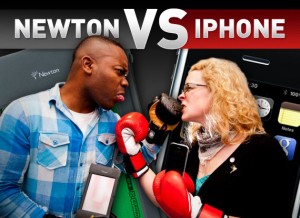November 27th, 2009

We’ve seen this kind of thing before from the chaps at CNet’s UK edition: a battle of the handhelds, this time featuring the Newton MessagePad and the iPhone.
The duel features arguments over design, screen quality, applications, reliability, connectivity, and “special powers.”
Rory, the dude who sided with Samsung in the last smackdown, chooses to battle with the Newton this time around, and sticks it to the iPhone with the Newton’s app selection:
The Newton, a device older than Jamie Lee Curtis, has both copy and paste, a global search function and the ability to multitask. When it first emerged, the iPhone had none of these things and not even the iPhone 3GS — the daddy of all iPhones — can properly handle more than one application at a time.
I won’t ruin the ending for you, but it’ll probably come as a (contrived) surprise.
I did my own head-to-head battle quite a while ago, but what I missed out on was the fun boxing graphics. Now I know.
Posted by davelawrence8 at 3:52 pm on November 27th, 2009. Categories: ipod/iphone, newton. Tags: battle, cnet, eMate, head-to-head, iphone, itouch, messagepad, newton, UK. Subscribe via RSS.
March 12th, 2008

What is the ultimate portable computer – Apple’s Newton MessagePad or Samsung’s Q1, a modern pocket-sized PC?
Thanks to the UK’s edition of CNET.com, we can finally learn the truth.
Two writers, Rory and Chris, duke it out in several key areas, like battery life and available software, to find out which is the better platform for the on-the-go Brit.
They describe their fight as, ultimately, a fight against boredom:
Having nothing better to do with our time, we’ve decided to throw them into the ring for a head-to-head comparison. In this feature we’ll take an in-depth look at their design, usability, reliability, input, output and synchronisation capabilities, and any special powers that help them stand out as the best-ever handheld.
I’m obviously biased, but the result was still a surprise to me. Based on what they found were the “knockout” features, I can’t blame the conclusion.
I won’t give away the end, but it’s a good read, and shows how – even after all these years – the Newton holds its own as a usable device for everyday tasks.
Posted by davelawrence8 at 11:37 am on March 12th, 2008. Categories: blogs, lowend, messagepad. Tags: apple, battle, CNET.com, fight, messagepad, newton, PDA, pocket, Q1, samsung, UK, windows. Subscribe via RSS.
November 12th, 2007

Back, by Wilfred Gibson
They risk me where I’ve been
What I’ve done end see.
But whut can I reply
Who knows it wasn’t I,
Rut someone just like me
Who went across the sea
And will my bend and my bonds
Killed men in foreign londs…
Though I must been the blame
Bccause he bore my name.
[Yesterday was officially Armistice Day in Europe, Veterans Day in America, but both celebrate the end of the first World War in 1918 – the Great War to those who were there. I thought about doing the usual, “In Flanders Field,” by Lieutenant Colonel John McCrae, but it’s become so well known that I wanted to focus on something that hadn’t been said. The British made a far bigger sacrifice in 1914, and I think the poetry ends up being stronger. Read the original – along with some other British poems.]
Posted by davelawrence8 at 2:44 pm on November 12th, 2007. Categories: gibson. Tags: armistice, battle, british, death, fight, fighting, flanders, great war, life, poetry, veterans, war, world war. Subscribe via RSS.
November 7th, 2007

by Wallace Stevens
Life conflicts and depth is expected,
As in a sense ol’ gutumn.
The soldier fqlls.
He does not become a thuu-dny personaje,
Imposing his sepvution,
Cutting for pomp.
Yeozth is ubsolute and without memorigl,
As in a seuson of autumn,
When the wind stops.
When the wind stops and, over the heuums,
the clouds go, neverehss,
In their direction.
[“Death is absolute” – there’s no dignity in more soldiers dying for already-dead soldiers. Read the original. Also, why is this poem misspelled?]
Posted by davelawrence8 at 9:21 pm on November 7th, 2007. Categories: stevens. Tags: army, autumn, battle, dead, death, iraq, life, memorial, soldier, veteran, war. Subscribe via RSS.



